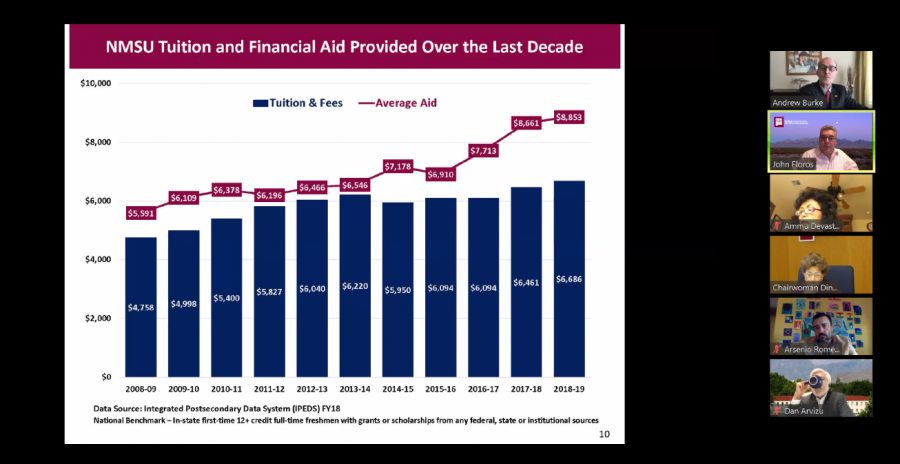NMSU Board of Regents approve tuition hike for Fall semester

More stories from Aimee Ryan
Graphic shows NMSU financial aid has topped average tuition over the last decade. (Courtesy Photo)
The Board of Regents of New Mexico State University approved a 3% increase to 2020-2021 tuition at the NMSU Las Cruces campus and a zero percent increase for remaining NMSU campuses in 4-1 vote during their special meeting April 21.
The NMSU administration argued a tuition increase is necessary for several reasons—the university cannot be certain about how funding from the State of New Mexico under economic downfalls, there is need to support university scholarships funds and because of what President John Floros called a positive net price that some students have after receiving financial aid.
This net price, Floros said, is the balance remaining when combining how much a student is charged by the university and how much the university “provides back to the student.”
Floros said that NMSU provides most of the financial aid given to the “average student” at NMSU.
“Not only are we doing this for the average student, but for the students that need the most help. We provide most of the support and most of the aid, so I just wanted you to understand that.” Floros said to the Board of Regents. “And when you take that those numbers together, we’ve produced what is known as net price.”
Floros’s average net price formula to attend a university includes the balance between financial aid, tuition, fees and room and board. A PowerPoint presentation by Andrew Burke, senior vice president for administration and finance, revealed that NMSU has the second lowest average net price for an in-state first-time full-time student out of the seven New Mexico Four Year Higher Education Institutions (HEIs) during the 208-2019 fiscal year.
NMSU is an affordable institution, Floros said, when factoring average net price. He added that NMSU is one of the two available research institutions in the state, the other university being the University of New Mexico.
“So basically the message here is Mexico State University, one of the two large research public universities in the state, is more affordable than any of the other universities within our state—which are not, they don’t even have the responsibility of doing research and outreach like we do,” Floros said.
Floros also went on to state that if an NMSU student does not pay for housing and dining, the average student receives a refund check. Chancellor Dan Arvizu said that the average loan amount for NMSU freshmen is $1,734, and this figure includes freshmen students required to purchase housing and dining plans as well as freshmen who are not required to do so.
Student regent Luke Sanchez raised a concern about the idea of average net price, as he said that hearing about a tuition increase while not understanding average net price may be unsettling for some students. Sanchez said students should be informed on what the administration means by “average net price.”
Regent Arsenio Romero asked if prospective NMSU students understand average net price and what requirements need to be met to qualify for aid at NMSU.
Due to COVID-19, NMSU is currently admitting undergraduates solely based on high school grade point average and not ACT / SAT scores. High school guidance counselors are being made aware of this change, Floros said.
Institutional scholarships have required higher ACT/SAT and GPA requirements throughout the past few years, Floros said, in an attempt for NMSU to stray away from debt, as he referenced scholarships promised to incoming students from before his and Arvizu’s administration.
“The reason we’ve had this big debt so far is because we started this three years ago, and the first budget that was created back then—it was way off. A lot more kids came with higher academic credentials, so we had to pay much more money in terms of scholarships out,” Floros said.
Floros said “we’re about to swallow the rat,” meaning that the budget gap created by these scholarships has been closing within the past few years. Some money received from the upcoming tuition increase will go back to scholarships, Floros said.
Chancellor Dan Arvizu spoke about the uncertainty of the State of New Mexico’s future economy and how that will possibly affect 2020-2021 funding from the state. The state economy relies heavily on oil production, however, prices in this industry have recently dropped to negative figures across the country.
Arvizu said there will likely be a special legislative session in June for the State of New Mexico where NM House Bill 2 will be revised, as it was designated to appropriate funding to NMSU and other accounts across the state.
“We’re operating under a bill that essentially is the law of the day, but expectations are that when the special session meets in June, things will be dramatically different,” Arvizu said.
Given local economic factors, Arvizu recommended that the regents approve of the tuition increase to help NMSU balance its upcoming budget.
“In in the context of this information, which is obviously relatively new for us over the course of the last few weeks, I think our recommendation to the board is going to be that we get as close to being able to balance our budget as we possibly can—recognizing that we really don’t have a clear picture of where we’re going to be,” Arvizu said.
Sanchez expressed concerns about students not wanting to pay more in tuition should all fall classes be moved online due to the COVID-19 pandemic.
“One universal concern that I’ve heard and that I share is what if we had to continue online learning in the fall semester? That is something that most students aren’t okay with, I, myself included—I’m in a degree where I benefit a lot more by being in the classroom,” Sanchez said.
Floros said that the university is currently planning to hold face-to-face courses in the fall, and Sanchez said he is okay with the tuition increase if the increase will help fund scholarships.
Before the regents voted to increase tuition, Floros closed the discussion by saying the administration did not want to increase tuition, but that doing so preserves the institution’s quality.
“None of us wants to raise tuition, so please keep that in mind. We are not here to raise tuition for the students—we’re here to preserve the institution, its quality and its future. And beyond that, we don’t know what’s going to happen with the state budget,” Floros said.

Aimee Ryan is a senior and Southern New Mexico native entering her fourth year at The Round Up and her first year as an editor. She worked as a staff writer...

